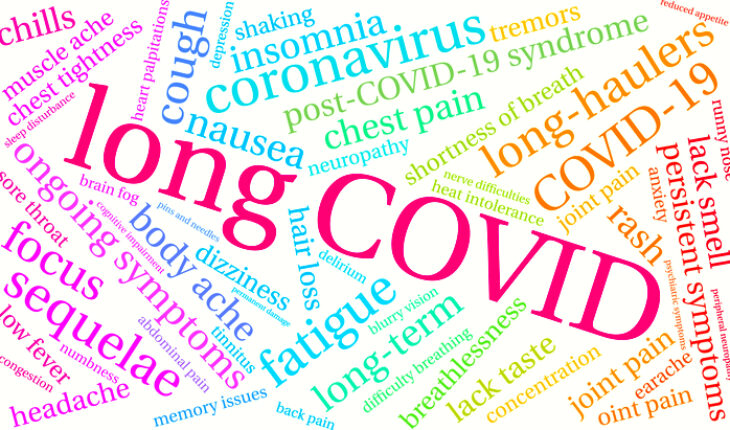When I was suffering from Long Covid back in 2020, I would have done almost anything to wave goodbye to the profound fatigue and brain fog which made it hard to get out of bed, never mind carry on my job and looking after my three young children. It was a draining and scary experience which left me doubting my own sanity at times. Testing wasn’t yet a thing and they still called us ‘long haulers’.
So it doesn’t surprise me that many people with Long Covid today are reportedly paying vast sums to try and find a cure, many of which are experimental and may even be dangerous. A new report by the British Medical Journal and ITN news reveals that patients are now paying upwards of £40,000 to access a blood-washing treatment known as H.E.L.P. apheresis therapy that is usually used to help patients with familial hypercholesterolemia resulting in cardiovascular disorders. Hundreds have already been treated in clinics in Germany, Cyprus and Switzerland, with no evidence that it makes any difference to Long Covid
symptoms.
According to the Office for National Statistics (ONS), there are nearly two million people in Britain say they still have symptoms of fatigue, memory problems and muscle weakness four months after an initial positive test result. A recent article in The Lancet in January 2022 reported the stark truth:- there are still no proven treatments for the condition, which seems to be linked to widespread inflammation in the body. ‘The disease mechanisms causing long COVID are unknown, and there are no evidence-based treatment options. Clinical guidelines focus on symptom management, and various treatment options are being evaluated. The scarcity of advice has often left people with long COVID feeling isolated and frustrated in their search for therapies.’
The article, co-written by Dr Shamil Haroon, associate clinical professor at the University of Birmingham and a researcher in the Therapies for Long Covid in Non-hospitalised Patients trial,
concluded: ‘People with long COVID reported turning to a vast range of over-the-counter medicines, remedies, supplements, other therapies, and dietary changes to manage relapsing and remitting symptoms. Individuals have expressed a willingness to try anything because symptoms have substantial effects on quality of life and work capability.’
A quick trawl of the posts on the Long Covid Support Group Facebook page confirms that sufferers are willing to pay for treatments ranging from the speculative to the frankly scary. A post by Emily Z, published on October 22 2021, is typical of many: ‘Has anyone had IV Ozone therapy?’ she asks. ‘I’d love to hear if it was successful or harmful…It’s all so expensive, though reclaiming my life would make it worth it!’ According to the website of a US provider, Drip Hydration, ‘blood is drawn and the ozone gas is dissolved into the blood. The blood with the dissolved gas is then injected back into the body through an IV.’
In 2019, the Food and Drug Administration(FDA) in the US warned against using ozone therapy and there case reports of the use of ozone resulting in air embolism, bloodborne infections, and even loss of sight after receiving ozone therapy. Ozone gas itself is harmful to humans and has toxic effects on people’s lungs when combined with nitrogen dioxide in smog.
Another popular therapy with long haulers seems to be hyperbaric oxygen treatment, which involves breathing pure oxygen in a pressure chamber. The expense is alarming. Jason D, a musician based in the US, recently posted on the Long Covid support Group facebook page: ‘Hi all, so I had a consult yesterday for hyperbaric oxygen treatment. They want 20-40 sessions, 2 hours each, starting with 5 x per week, $200 per session. I was surprised it would be this intensive. Has anyone done less treatments, say 15 total 1x per week and seen any benefit?’ Hyperbaric oxygen therapy is a well-established treatment for decompression sickness, a potential risk of scuba diving. Patients breathe in pure oxygen instead of the 21% found in normal air, and the pressure increases the amount of oxygen that dissolves into the bloodstream and the body’s tissues. But why this should help long Covid is anyone’s guess.
Professor Charles Bangham, Professor of Immunology and Co-Director of the Institute of Infection at Imperial College London, says that people should show extreme caution before embarking on untried treatments. ‘Many people with Long Covid are understandably frustrated, and some are desperate to see a way forward but I would strongly advise people to examine carefully any health claims that are being made,’ he says. ‘Any treatment has the potential for side effects, particularly invasive treatments. And no-one should be spending thousands of pounds on therapies which are at best experimental, and at worse, completely ineffective.’
Some alternative treatments have some scientific credentials, but again, the results tend to be preliminary. The Perrin Technique, which incorporates massage, spinal mobilisation and cranial techniques, is an osteopathic treatment system which claims to improve lymphatic drainage around the central nervous system. The benefit is based on the premise that this procedure helps to clear toxins, allowing the body’s systems to return to healthy function. According to a study published in the June 2022 issue of Cardiovascular Endocrinology and Metabolism, the technique may help reduce symptoms of physical fatigue in men and women with Long Covid, as well as improving energy levels and concentration. But the study was small – just 20 patients in all.
Some people have also tried dietary supplements to relieve the symptoms of Long Covid. But according to the British Dietetic Association, there is no evidence for their efficacy. ‘Some people with Long Covid believe that high doses of vitamins, such as niacin (vitamin B3), vitamin C, vitamin D, quercetin and zinc improve their symptoms. However, there is no scientific evidence that these supplements work, and taking high doses can harm you.
Greta M, writing on the Facebook Long Covid Support Group page on April 16 2021, explained that she was taking fluvoxamine, low-dose naltrexone, a mitochondrial support cocktail, Chinese antiviral herbs, antihistamines, B12 shots and a mast cell stabilizer. ‘Everything helped a little, but nowhere near enough,’ she commented., adding, ‘let’s face it most treatments don’t work.’
In my case, I waited it out without supplements or expensive therapies – it took over a year – and I gradually improved. I did suffer from exercise intolerance – another typical feature of Long Covid – and invested in a personal Muay Thai boxing instructor who came to my door three times a week and brooked no excuses. The adrenaline rush of kicking and punching an actual opponent helped fire up my sluggish energy and got rid of quite a lot of my frustrations at the same time. A six month subscription to the lifestyle app Noom, helped me drop the excess pounds that I gained gained due to enforced inertia.
The good news is that a therapy called Breathing Pattern Disorder, available on the NHS, does seem to be making a difference to people with the condition. Treatment is already available at Long Covid clinics up and down the country which can be very effective at helping people get back to better breathing habits. Rebecca Livingston is a specialist respiratory physiotherapist based at the post-covid follow up service at UCLH in London, the first of its kind to open in England back in May 2020.
‘Whatever the trigger, a person with BPD typically breathes faster than they should usually using the chest and neck muscles rather than the belly and diaphragm. Breathing can also be quite noisy because people are taking big breaths one after the other using the upper chest. ‘Normal breathing should be much slower, with relatively little air volume changing in the lungs with each breath and only small movement in the tummy.’ ‘We show people what a normal breathing pattern should look like and then get them to put their hands on the tummy to to see where the diaphragm should be working. The important thing is that we can help fix the problem.’ Psychological interventions can also tackle depression and anxiety which often accompanies a diagnosis of Long Covid.
Professor Bangham says there are several reasons to be optimistic. ‘Long Covid is significantly less common in people who were vaccinated before they caught the virus. Also, the recent (omicron) variants of the Covid 19 virus seem to cause Long Covid less often than the previous variants. For example, a recent study by King’s College London found that omicron was half as likely as other variants to cause Long Covid.’
- Biden Declines Second Term: Health Concerns - 23rd July 2024
- New catheter coating stops bacteria cells from swarming - 10th June 2024
- AI-designed catheters could dramatically reduce urinary tract infections - 10th June 2024







